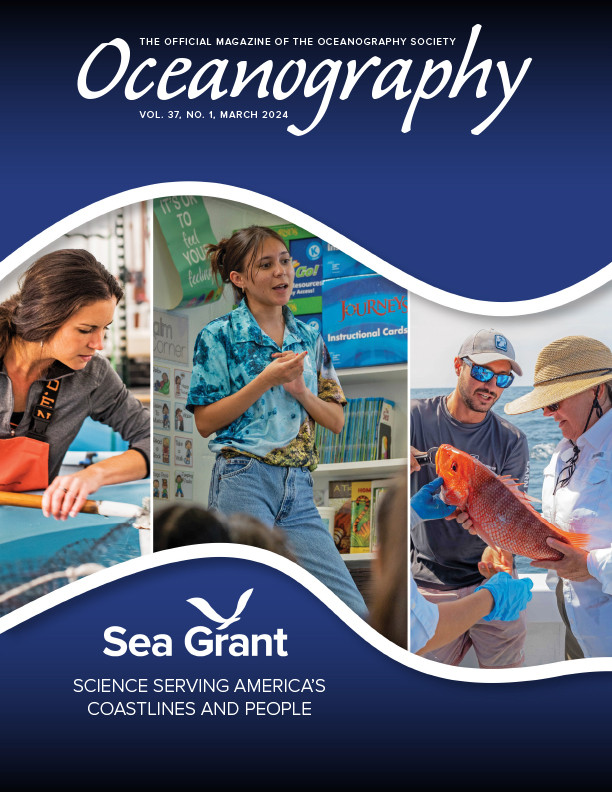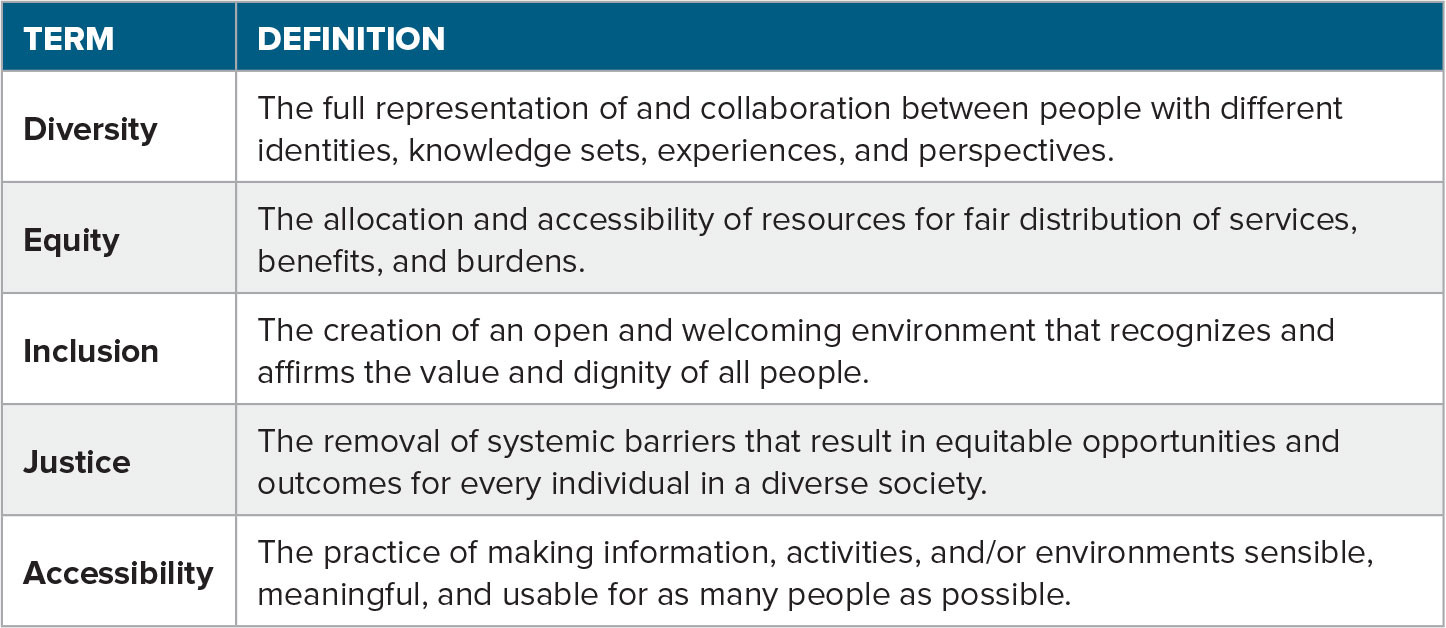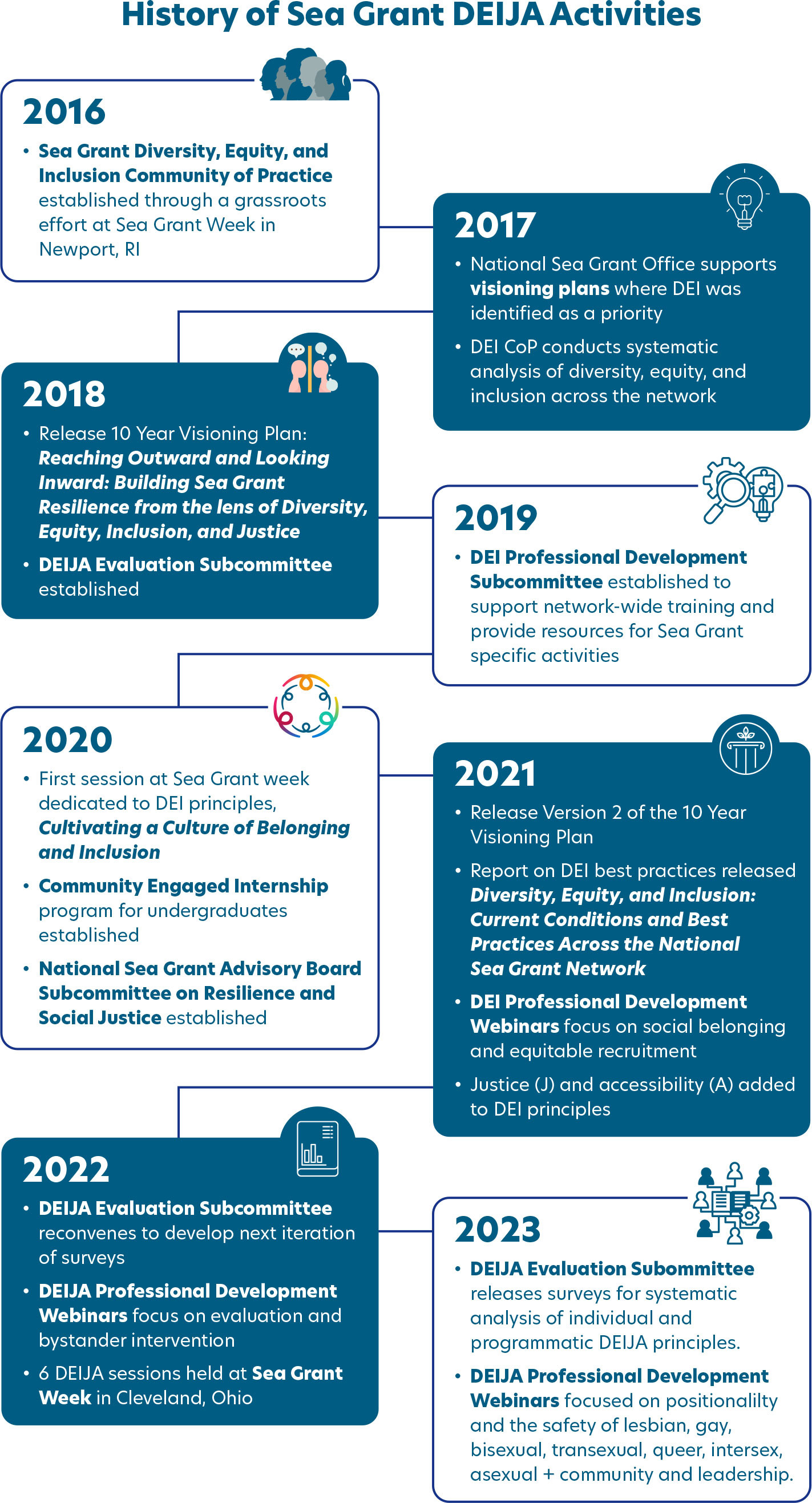
View Issue TOC
Volume 37, No. 1
Pages 40 - 43
Reflecting on Sea Grant’s Efforts to Strengthen DEIJA and Support Resilient Coastal Communities
By Kayj Morrill-McClure and Elizabeth A. Lenz
- Published Online: April 29, 2024
- https://doi.org/10.5670/oceanog.2024.219
- Full Article:
 PDF
PDF
- Export Article Citation: BibTeX | Reference Manager
- Share
Full Text
CENTERING DEIJA IN SEA GRANT
Less than 10% of the contiguous United States is coastal, but coastal counties account for approximately 40% of the US population (Crossett et al., 2013). As communities located along US coastlines continue to grow, they are also more racially and ethnically diverse compared to those inland. These growing populations are confronted by the cumulative impacts of climate change, natural hazards, and disasters. Sea Grant has a responsibility to these coastal communities, including those in Alaska, the Caribbean, and around the Great Lakes and the Pacific Islands, who contribute little to greenhouse gas emissions but are disproportionately impacted by the effects of climate change (EPA, 2021; Jay et al., 2023). Reflecting that responsibility, the mission and vision of Sea Grant are tied strongly to the principles of diversity, equity, inclusion, justice, and accessibility (DEIJA) as they relate to inclusive and diverse coastal communities:
Sea Grant’s mission is to enhance the use and conservation of coastal, marine, and Great Lakes resources to create a strong and sustainable economy, a healthy environment, and resilient and inclusive communities.
Sea Grant envisions diverse, thriving coastal communities and ecosystems that are supported by an engaged, environmentally literate public and informed decision-makers.
In this article, we use the definitions of diversity, equity, inclusion, justice, and accessibility that have been agreed upon by the Sea Grant DEIJA Community of Practice (Table 1; National Sea Grant, 2021).
TABLE 1. Definition of terminology developed and agreed upon by the Sea Grant Diversity, Equity, Inclusion, Justice, and Accessibility (DEIJA) Community of Practice. > High res table |
An equitable community is a resilient and inclusive community. Increasing accessibility and addressing environmental injustice leads to diverse, thriving coastal communities and ecosystems. Training Sea Grant personnel in the principles and best practices of DEIJA can improve connection with communities and support workforce development.
ESTABLISHING A DEIJA COMMUNITY OF PRACTICE
Recognizing the need to incorporate DEIJA into all aspects of Sea Grant’s work, the DEIJA Community of Practice was formed in 2016. Led by Ed Lewandowski and Jen Merrill of Delaware Sea Grant and Jane Harrison of North Carolina Sea Grant, a group of 35 to 40 people representing nearly all 34 Sea Grant programs came together to identify issues and develop pathways toward improvement (Figure 1). This DEI Community of Practice acquired support from the National Sea Grant Office to draft a DEI vision document, Reaching Outward and Looking Inward: Building Sea Grant Resilience from the Lens of Diversity, Equity, Inclusion, and Justice (hereafter, “Sea Grant DEIJ 10-Year Vision”), published in 2018 (National Sea Grant, 2021). That document includes the DEI Vision:
Sea Grant cultivates a culture of belonging wherein every Sea Grant professional and state program is committed to promoting diversity, equity, inclusion and justice (DEIJ). This vision is achieved by proactively recruiting, retaining, advancing and preparing a diverse workforce; removing barriers that have historically limited access to Sea Grant opportunities in research, extension, and education; progressing equitable access to resources and decision-making processes; and engaging and serving communities, partners, and stakeholders that are representative of the demographics of the places where our programs operate. DEIJ are defined as core values for Sea Grant.
|
|
The DEIJA Community of Practice currently has approximately 200 members and is led by Sea Grant professionals who are elected every two to four years to serve as co-chairs. The original co-chairs were Mona Behl of Georgia Sea Grant and Jane Harrison of North Carolina Sea Grant. Co-chairs facilitate discussions and coordinate quarterly hybrid meetings and biennial in-person sessions at Sea Grant Week. As the DEIJA Community of Practice has matured over the years and become a reliable resource to the network, the National Sea Grant Office, the Sea Grant Association, and the National Sea Grant Advisory Board have engaged the DEIJA Community of Practice for guidance on best practices (Antonucci et al., 2021; National Sea Grant, 2021). Moreover, co-chairs of the DEIJA Community of Practice are regularly invited to attend Sea Grant Network meetings to share individual programs’ progress towards the 10-year vision and to communicate DEIJA best practices (see online supplementary Figure S1).
DEIJA SUBCOMMITTEE ACTIVITIES
Currently, two committees established within the DEIJA Community of Practice support evaluation and professional development. The Evaluation and Professional Development Subcommittees established in 2018 and 2019, respectively, are critical in manifesting the DEIJA vision. Since their inception, these subcommittees have provided feedback on areas of improvement and strengthening of external relations beyond Sea Grant with DEI practitioners, academic institutions, and nongovernmental organizations. The purpose of the Professional Development Subcommittee is to provide tools, resources, and DEIJA training to Sea Grant professionals, and to coordinate events (e.g., webinars, conference sessions, and community engagement) that enhance DEIJA efforts across the Sea Grant network (e.g., equitable recruitment and hiring, promoting safe workplace culture for LGBTQIA+).
Results of a survey on demographics and workplace environment across the Sea Grant network conducted by the DEIJA Community of Practice in 2017 were shared in “Sea Grant’s 10-Year DEIJ Vision” (National Sea Grant, 2021). One of the primary needs identified was to “provide regular training and professional development on DEIJ.”
A second subcommittee on professional development was created to achieve the goals of the “10-Year DEIJ Vision.” The familiarity with and increased capacity of videoconferencing developed during the COVID-19 pandemic helped the committee provide professional development opportunities across the network in the noncontiguous (e.g., Alaska, Guam, Hawai‘i, and Puerto Rico) and contiguous United States.
Since 2019, the Professional Development Subcommittee has prioritized topics identified by the DEIJA Community of Practice in the vision, in quarterly discussions, and by shared challenges. Some of the topics covered over the last four years include:
- Developing a DEI Subcommittee and Action Plan
- Cultivating a Sense of Belonging and Inclusion
- Hosting Equitable and Inclusive Events
- Panel Discussion on the Documentary Can We Talk? Difficult Conversations with Underrepresented People of Color: Sense of Belonging and Obstacles to STEM Fields
- Equitable Recruitment and Hiring Strategies
- Evaluating DEIJA Efforts and Survey Techniques
- Bystander Training
- Supporting the LGBTQIA+ Community
- Understanding Privilege and Mapping Positionality
- Positionality and Relationship Mapping
The subcommittee places emphasis on presentations and workshops that provide concrete actions that can be tailored and applied to other programs. Outputs generated by the subcommittee are made internally available on Sea Grant’s DEIJA Community of Practice’s national webpage. Presenters consist of Sea Grant staff, invited experts, and National Sea Grant Office representatives. Presentations that offer the opportunity to learn directly from Sea Grant staff about programmatic development of DEIJA activities, such as auditing programs or creating positions, in order to better understand potential challenges and administrative hurdles have been most effective (Antonucci et al., 2021). See Figure S1 for selected examples of recent DEIJA initiatives at the programmatic level. A second survey was conducted between October 2023 and January 2024 to assess progress in workplace climate, demographics, and DEIJA-related activities across the network.
CHALLENGES
Over the last eight years, the DEIJA Community of Practice has made huge strides in generating best practices and a community of practitioners that create positive change throughout the network. The major needs identified by individual programs are for DEIJA training, support to implement that training, and rewards for those participating. Though DEIJA resources are abundant, there is a call for resources and training that are vetted, easy to find, and easy to access. Online repositories are a good start for addressing this need, but they must be maintained and organized. Communication about available resources and upcoming training has been challenging, especially trying to communicate with staff outside of the DEIJA Community of Practice who might be interested. Leaning into using tools like mailing lists and websites can help, but even more important is time and staff to do the vetting and communicating. Finally, creating community across a wide network has also been challenging. While virtual meetings have made network-wide webinars and training more accessible, the virtual space can inhibit deeper collaborative connections to enrich progress on specific Sea Grant needs in communication, education, extension, and research. There is no substitute for being in the same physical space as other people with time to talk and connect. Prioritizing some in-person DEIJA Community of Practice events would help further build and fortify a collaborative community.
DEIJA activities across the Sea Grant network have relied heavily on volunteers taking on implementation of Sea Grant’s 10-year DEIJA vision within their individual programs in addition to their normal duties and responsibilities. This additional workload includes engagement with the broader network to effectively refine DEIJA efforts. A few Sea Grant faculty and staff have only recently included DEIJA in their official titles, professional descriptions, and annual work plans, so they can use some of that time to do DEIJA work, but they may have other responsibilities that take precedence. The progress of DEIJA activities across the Sea Grant network is not sustainable if the work continues through unpaid labor and non-promotable tasks. Having more staff with DEIJA as a sizable percentage in their work plans would help so that leadership could recognize these activities as promotable tasks. Strong guidance from individual Sea Grant programs’ vision and mission statements would also help as would committed funding to support the resilience of diverse coastal communities effectively.
CONTINUING THE WORK
We hope this overview of our coordinated grassroots efforts over the last eight years as a 34-program network and our selected examples inspires others to continue advancing DEIJA principles in professional and public spaces so our coastal communities may continue to thrive and be resilient in the face of adversity.
ACKNOWLEDGMENTS
We would like to thank the Oceanography special issue editorial team; the DEIJA Community of Practice; Mona Behl, Jane Harrison, and Melissa Watkinson-Schutten for their leadership and commitment to Sea Grant DEIJA initiatives and creating meaningful change; and the Evaluation and Professional Development Subcommittees. We especially thank the original members of the DEIJA Community of Practice: Paula Cullenberg (AKSG), Teresa Talley (CASG), Deborah Seiler (CASG), Anoushka Concepcion (CTSG), Edward Anthony Lewandowski (DESG), Jennifer Zelenke Merrill (DESG), Jim M. Falk (DESG), Mona Behl (GASG), Marie Auyong (UOGSG), Caitie McCoy (IISG), Kris Stepenuck (LCSG), William Valliere (LCSG), Dianne Lindstedt (LASG), Beth Bisson (MESG), Kristen Grant (MESG), Jennifer Dindinger (MDSG), Judy Gray (NSGAB), Julia Galkiewicz (NSGO), Mary Garlic (NSGO), Samuel Chan (ORSG), Nikola Garber (NSGO), Julia Peterson (NHSG), Claire Antonucci (NJSG), Diana Burich (NJSG), Rebecca Nagy (NJSG), Kathy Bunting Howarth (NYSG), Susan White (NCSG), Diana Hackenburg (NCSG), Jane Harrison (NCSG), David Hansen (ORSG), Sarah Kolesar (ORSG), Mary Pleasant (ORSG), Ann Faulds (PASG), Sarah Whitney (PASG), Susan Lovelace (SCSG), Michael Jahncke (LCSG), Gwyn Hinton (WASG), and David Allen Hart (WISG). Thank you to the organizers and speakers of DEIJA Professional Development activities, including those who participated in the DEIJA Session at the 2022 Sea Grant Week in Cleveland, Ohio: Brita Jessen, Anita Shelton, Susannah Sheldon, Julia Peterson, Sarah Kolesar, Connie Sullivan, Jenny Engels, Lian Guo, Jennifer Hauxwell, Geneva Langeland, Brooke Carney, Camaron Miyomoto, and to our invited experts for taking time to share their thoughtful work and experiences with our DEIJA Community of Practice.
Citation
Morrill-McClure, K., and E.A. Lenz. 2024. Reflecting on Sea Grant’s efforts to strengthen DEIJA and support resilient coastal communities. Oceanography 37(1):40–43, https://doi.org/10.5670/oceanog.2024.219.
Supplementary Materials
• Supplementary Figure S1 (49 KB pdf)
References
- Antonucci, C., M. Auyong, M. Behl, D. Burich, S. Chan, M. Covi, A. Faulds, J. Harrison, S. Kolesar, E. Lewandowski, and others. 2021. Sea Grant Diversity, Equity and Inclusion: Current Conditions and Best Practices across the National Sea Grant Network. The National Sea Grant College Program, 40 pp., https://seagrant.noaa.gov/wp-content/uploads/2023/07/DEI-Best-Practices-Paper.pdf.
- Crossett, K., B. Ache, P. Pacheco, and K. Haber. 2013. NOAA’s State of the Coast. National Coastal Population Report: Population Trends from 1970 to 2020. National Oceanic and Atmospheric Administration and US Census Bureau, 29 pp., https://aambpublicoceanservice.blob.core.windows.net/oceanserviceprod/facts/coastal-population-report.pdf.
- EPA (Environmental Protection Agency). 2021. Climate Change and Social Vulnerability in the United States: A Focus on Six Impacts. US Environmental Protection Agency, EPA 430-R-21-003, https://www.epa.gov/cira/social-vulnerability-report.
- Jay, A.K., A.R. Crimmins, C.W. Avery, T.A. Dahl, R.S. Dodder, B.D. Hamlington, A. Lustig, K. Marvel, P.A. Méndez-Lazaro, M.S. Osler, and others. 2023. Overview: Understanding risks, impacts, and responses. Chapter 1 in Fifth National Climate Assessment. A.R. Crimmins, C.W. Avery, D.R. Easterling, K.E. Kunkel, B.C. Stewart, and T.K. Maycock, eds, US Global Change Research Program, Washington, DC, USA, https://doi.org/10.7930/NCA5.2023.CH1.
- National Sea Grant. 2021. Reaching Outward and Looking Inward: Building Sea Grant Resilience from the lens of Diversity, Equity, Inclusion, and Justice. National Sea Grant’s 10-year Diversity, Equity, Inclusion, and Justice (DEIJ) Vision, Version 2 [Strategic Plan], 26 pp., https://seagrant.noaa.gov/wp-content/uploads/2023/06/DEI_VisionActions_2_0_Sea-Grant_2022-upload.pdf.
- National Sea Grant College Program. 2023. National Sea Grant College Program 2024-2027 Strategic Plan: All Hands on Deck. National Sea Grant College Program, Silver Spring, MD, 27 pp., https://seagrant.noaa.gov/wp-content/uploads/2023/07/2024-2027-Strategic-Plan-final_3-8-23.pdf.
Copyright & Usage
This is an open access article made available under the terms of the Creative Commons Attribution 4.0 International License (https://creativecommons.org/licenses/by/4.0/), which permits use, sharing, adaptation, distribution, and reproduction in any medium or format as long as users cite the materials appropriately, provide a link to the Creative Commons license, and indicate the changes that were made to the original content. Images, animations, videos, or other third-party material used in articles are included in the Creative Commons license unless indicated otherwise in a credit line to the material. If the material is not included in the article’s Creative Commons license, users will need to obtain permission directly from the license holder to reproduce the material.


